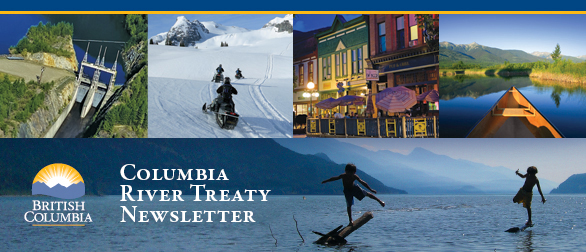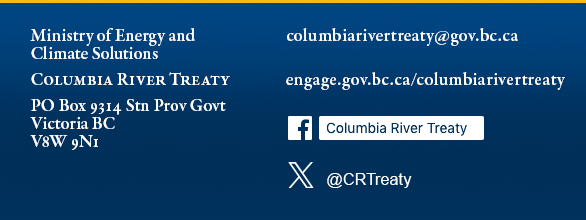Columbia River Treaty
Edition: February 2019

Treaty Negotiations Update
Feb 7, 2019
2018 was an important year in the history of the Columbia River Treaty. In May, over 50 years after the Treaty was originally ratified, negotiators representing the governments of the United States (U.S.) and Canada (including British Columbia) sat down together in Washington, D.C., to start discussions about the Treaty’s future. This was the first time negotiators from the two countries had met to revisit the Treaty since the early 1960s.
Following the inaugural round of meetings, negotiators came to the Columbia Basin for sessions in Nelson, B.C., on Aug. 15 and 16, and in Portland, Oregon, on Oct. 17 and 18. The year wrapped up with a two-day session in Vancouver, British Columbia (B.C.), on Dec. 12 and 13, 2018.
The Treaty was originally created to reduce flood risk and increase power generation on the Columbia River. Negotiators are now discussing how the Treaty can be modernized to reflect present and future needs of Canada and the U.S.
In Canada, Indigenous Nations are a key part of the process. When the Treaty was originally drafted, Indigenous perspectives were not part of the conversation. Today, governments are taking a very different approach. The governments of Canada and B.C. have been working closely with the Canadian Basin Indigenous Nations since 2012 to discuss the future of the Treaty.
As well as working with Indigenous Nations, the governments of Canada and B.C. are also giving a voice to the broader Columbia Basin community. In 2012 and 2013, the B.C. government did extensive consultation with local communities, which helped develop the B.C. Decision and Guiding Principles. Those principles guide Canada and B.C. in negotiation discussions.
Now, when negotiators from Canada and B.C. sit down with their American counterparts, they will bring perspectives that reflect Indigenous and local resident interests.
Negotiations will resume in Washington, D.C., on Feb. 27 and 28, 2019. There is no “deadline” for the negotiations to finish, because the Columbia River Treaty does not have an “expiry date.” However, either Canada or the U.S. can terminate the Treaty any time after Sept. 16, 2024, provided they give written notice at least 10 years in advance.
There is one part of the Treaty that is set to expire in 2024, and it’s significant. In 1964, the U.S. paid B.C. $64 million for 60 years of flood control services, in order to avoid the type of catastrophic flooding that destroyed the Oregon city of Vanport in 1948. If no other arrangement is negotiated by 2024, B.C.’s current flood control services will expire and be replaced by the less-reliable “Called Upon Flood Control,” which would likely increase the flood risk in the U.S. portion of the Columbia River Basin.
As negotiations continue, negotiators from Canada and B.C. are focused on making sure that benefits created by the Treaty are shared equitably on both sides of the border. While the Treaty currently provides benefits to B.C., many feel it does not account for the full range of benefits in the U.S. In addition, there have been significant and ongoing impacts in the Canadian Columbia Basin to meet Treaty requirements in the U.S. For example, Indigenous people and local communities have dealt with drastic fluctuations in reservoir levels causing environmental, economic and cultural losses as a result of the Treaty. Canada and B.C. are committed to working with the U.S. to modernize the Treaty to ensure that benefits created are equitably shared in both countries.
Katrine Conroy, British Columbia’s Minister Responsible for the Columbia River Treaty, has said that the current discussions are a chance for Canada and the U.S. to “build relationships and to find common ground.” She said, “I know that negotiators from both sides of the border are working very hard as they look at options for the future of the Treaty.”
Updates on negotiations are posted on the Province of B.C. Columbia River Treaty website: https://engage.gov.bc.ca/columbiarivertreaty/


